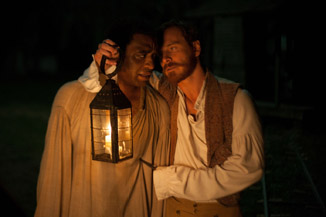The 400-Word Review: 12 Years a Slave
By Sean Collier
November 4, 2013
BoxOfficeProphets.com

Based on a true account published in 1853, 12 Years a Slave depicts the kidnapping of Solomon Northup, a free black man who lived with his wife and children in Saratoga, N.Y. Northup, a skilled violinist, was drawn to Washington under the pretenses of a performance; while there, he was drugged, chained and eventually sold into slavery.
To say that Chiwetel Ejiofor’s performance as Northup is award-worthy is obvious. It is a portrayal so astounding that it seems otherworldly; I’m reminded of Charlize Theron in Monster. In both cases, the performer worked so hard to embody their role that the result seems to be an actor communing with forces beyond normal artistry. A skilled and often vicious ensemble cast (led by Lupita Nyong’o, Michael Fassbender and Benedict Cumberbatch) also shines, but the show belongs to Ejiofor.
While many scenes in 12 Years a Slave are artfully and even lyrically presented, the circumstances and facts of Northup’s suffering are often starkly exhibited. After his kidnapping, he’s given the chance to go free: All he has to do is produce documentation of his status as a free man. Of course, he has none, and thus no legal recourse. Later, after he and other kidnapped blacks are transported south, a companion is rescued by a Northern associate testifying to his freedom; Northup cries out for assistance, but swiftly realizes they can offer none.
In this and many other ways, 12 Years a Slave directly attacks the institutions and legal procedures that made kidnappings like Northup’s possible and even probable in the 1800s. (Text after the final scene reveals that, despite legal proceedings, no one was convicted for their crimes against Northup.)
It’s a historical lesson, but also a timely one: when the rights and powers of any particular group are limited under the law, abuses inevitably occur. To the attentive viewer, 12 Years a Slave asks a powerful question: who does your society leave as helpless as this man? The fact that it doesn’t offer any answers may because there are none to give.
Sean Collier is the Associate Editor of Pittsburgh Magazine and a member of the Broadcast Film Critics Association. Read more from Sean at pittsburghmagazine.com/afterdark